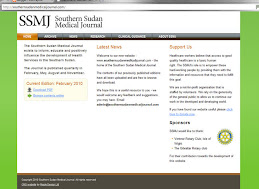I wanted to just follow-up our previous post a little. Matt wrote about life on the Emergency Medical Ward in Juba and some of the difficulties and frustrations that that can entail – some of the patients are extremely sick and like many nations in the developing world (due to a multitude of factors) many people die in Southern Sudan who perhaps wouldn’t in the UK with our education, ambulances, hospitals, intensive cares and the like.
Look at that handsome devil
But we’re keen not to give the impression that clinically it’s only very bleak. Quite the opposite in fact. The immense and very real challenges of dealing with such desperate situations generate an immense sense of teamwork, friendship and almost family feel amongst the hospital staff here. (“Communitas” one of my favourite authors would perhaps describe it.) Without meaning any offense to any in the UK, it’s one of the best working environments (from a staff morale perspective) I’ve ever worked in any hospital. There’s just not this much laughter back home. This is extremely rewarding in itself of course, but the medicine is also extremely professionally satisfying, as illustrated below:
Cleaning day
We’ve been having a good couple of days – the doctors are dribbling in again from the strike and the patients have all been quite stable and many clinically quite interesting. Today, Sister Anna alerted me to a patient outside, whom had not registered on my radar on my initial early-morning-ward-triage sweep. The reason he was outside as a new admission is because it’s Wednesday cleaning day, which is a whole other story... (I think Dave dealt with this on the blog last year. In summary: patients out, ward cleaned.) His story was one of 3 days of persistent vomiting and diarrhoea without the ability to maintain any oral intake. Examining him, I’ve never seen anyone quite so dehydrated. Very dry, Sunken eyes, reduced skin turgor, the works. He was also drowsy, unable to stand, freezing cold and clammy to touch (despite the >30 heat) a blood pressure so low he just didn’t have any radial (wrist) pulse to feel. In short, textbook signs of hypovolaemic shock.
Anna, being the awesome nurse she is, had already got two intravenous cannulae in and was fetching the fluids when she got me. Anyway, the point is this guy was at death’s door on arrival and thanks to the great team on the EMW was immediately picked up, and prompty fluid resuscitated. I couldn’t honestly believe the change after just 1 litre of fluid given IV – his warmth came back, the clamminess disappeared, his peripheral pulses returned and his heart-rate fell nicely. He actually told me “I feel much better – thank you. I thought I was going to die.” And he was right.
Anna, being the awesome nurse she is, had already got two intravenous cannulae in and was fetching the fluids when she got me. Anyway, the point is this guy was at death’s door on arrival and thanks to the great team on the EMW was immediately picked up, and prompty fluid resuscitated. I couldn’t honestly believe the change after just 1 litre of fluid given IV – his warmth came back, the clamminess disappeared, his peripheral pulses returned and his heart-rate fell nicely. He actually told me “I feel much better – thank you. I thought I was going to die.” And he was right.
Some monkeys we saw at breakfast one day
Now, I’m under no illusions here – the hero of this anecdote is of course Anna, who basically saved his life and my role as a doctor was more of a formality :o) However, the point is that it’s tremendously satisfying to treat patients like this. The stakes are high – most people are very very sick. But simple things done well and promptly can really save lives. It’s important to remember the success stories along with the sadder ones.
So there we are. In other news, we had a great evening the other night, wandering home in the evening to the mess, we saw a couple of the consultants (Mergani and Kajomsuk: O&G and Chest Physician respectively) just hanging around, having some tea. One of the many things I love about this place is how some of the best experiences just come along “unlooked-for” (to use a Tolkienien word). We cancelled badminton and just sat and just sat and chatted and laughed and the lady gave us some soup stuff she was cooking to try... it was great. They’re such good fun.
Anyway, that’ll do for now.
James & Matt
PS The following photos are mainly for Dave Attwood's benefit. Compare and contrast the progress of the landscaping from 2008 to 2009!

































